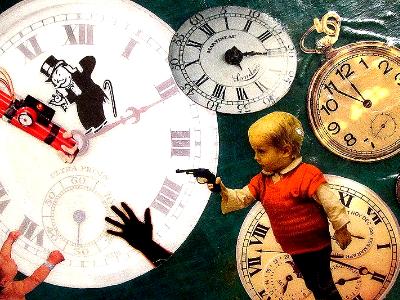 Munn, N. D. (1992). The cultural anthropology of time: a critical essay. Annual Review of Anthropology, 93-123. Control over time is not just a strategy of interaction; it is also a medium of hierarchic power and governance...Authority over the annual calendar (the chronological definition, timing, and sequence of daily and seasonal activities), or of other chronological instruments like clock time, not only controls aspects of the everyday lives of persons but also connects this level of control to a more comprehensive universe that entails critical values and potencies in which governance is grounded.
Controlling these temporal media variously implies control over this more comprehensive order and its definition, as well as over the capacity to mediate this wider order into the fundamental social being and bodies of persons. Hence, the importance of calendric and related time shifts connected with sociopolitical changes is more than political in the narrow pragmatic sense. It has to do with the construction of cultural governance through reaching into the body time of persons and coordinating it with values embedded in the "worldtime" of a wider constructed universe of power.
The changing regulation of work time in the West with its so-called "commodification" of time also illustrates control over timing as a mode of governance grounding the person and daily activity in a wider world order...Clock time is thus concretized in experience reaching (partly through the sonorous bells and increasing visibility of the clock) into the body to fuse with body time and space and back out into the visible object world of clocks and bells which cohere with the wider cosmic order of industry, science, and technology... Considered in the context of daily activity, clock time is quite alive, embodied in purposeful activity and experience. Coordinately, people are ongoingly articulated through this temporalization into a wider politico-cosmic order, a world time of particular values and powers.
Examining the body's disciplining through the "temporal elaboration of the act," Foucault pursues this dynamic into the micro-level of body time. Commenting on an 18th-century French military ordinance on marching steps, he argues that an "anatomo-chronological" schema or "programme" for constructing an "obligatory rhythm" is set out which systematically segments the body into spatiotemporal units. These units retotalize bodily motion into a preplanned "rhythm" imposed by a "disciplinary" militancy. "Time penetrates the body and with it all the meticulous controls of power"."And we absently delude ourselves that we know what time is because we know what time it is." -John Zerzan, Time and its Discontents in Running on Emptiness: The Pathology of Civilization, 2002, page 24."The clock, not the steam engine, is the key-machine of the modern industrial age. For every phase of its development the clock is both the outstanding fact and typical symbol of the machine: even today no other machine is so ubiquitous....In its relation to determinable quantities of energy, to standardization, to automatic action, and finally to its own special product, accurate timing, the clock has been the foremost machine in modern technics: and at each period it has remained in the lead: it marks a perfection toward which other machines aspire." -Lewis Mumford, Technics and Civilization, 1934, page 14-15."The computer, with its mechanistic playing out of predetermined rules, is the direct decendant of the clock." -W. Daniel Hillis, 'The Clock' in The Greatest Invention of the Past 2,000 Years, ed., John Brockman, 2000, page 141."The difference between human beings and their instruments disappeared when saved time was valued more highly than given time." -Arno Borst, The Ordering of Time, "The foundations of human time, to this day, are not found in the tick-tocking of the clock but in the pulse of life flowing between people and within the body. Time is anchored in the beat of the heart and its systolic and diastolic phases. 'The drum,' Algonquin Cree elder Jacob Wawatie told me once, 'is an extension of the heart.' Long-short, long-short; the basic iambic beat, which has long been the heartbeat of culture, is mimicked in the beating of a drum marking time for dancing or the telling of traditional stories." -Heather Menzies, No Time: Stress and the crisis of modern life, 2005, page 22. |